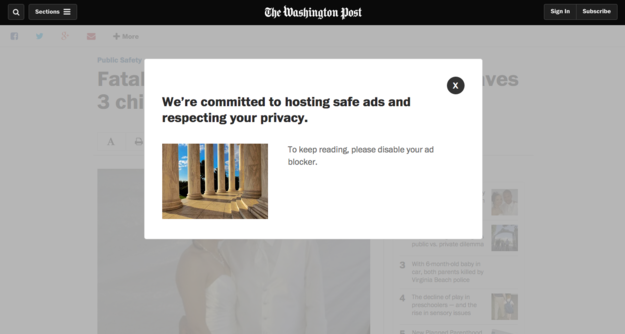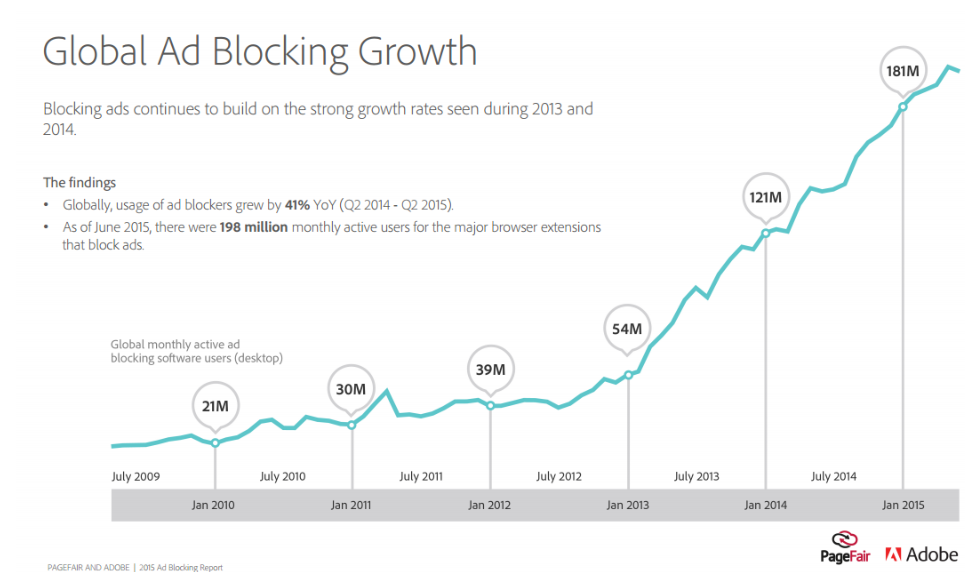Blocked party: Could Apple have a hand in the fall of free media?
Last Thursday, Apple rolled out the iOS 9 operating system – the very first to accommodate ad blocking technology.
Within hours, ad blockers were at the very top of the App Store and media sites faced a new, and all the more destructive enemy.
Many sites including The Independent, The Guardian, The Washington Post, The Huffington Post, Time, The Verge, Wired, Slate, Salon, Spin, Pitchfork, The Poke and many more, earn vast amounts of their income from onsite ads. Which is why, unlike The Financial Times and The Times, they remain free for people to use and enjoy.
According to some, the face of the internet itself could change if swathes of people begin using ad blocking technology on their phones, laptops and desktop computers.
Writing for Wired, Molly McHugh says that, “by blocking ads, [people] are depriving content publishers of advertising income and insights into what readers want.”
Although McHugh goes on to introduce and rate a string of various ad blocking apps for iOS 9 users, if she didn’t already put them off, she does reference this interesting article on just how the economics of free media websites work.
But Wired isn’t the only online publisher worried about ad blockers, as The Washington Post has stepped up testing on a programme that will outright block individuals who use ad blockers on its website.

“We’re doing a very short test as we often do on the site to see how we can further engage readers who might be using ad blockers,” a spokeswoman said Thursday, “many people already receive our journalism for free online, and in the long run, without income via subscriptions or advertising, we won’t be able to deliver the journalism that people coming to our site expect from us.”
Both CBS’s video player and Hulu refuse to play content for those who have ad blockers running on their machines.
Why Apple, Why?
At first, it is hard to fathom why Apple would support ad-blocking technology. But writing last week, The Verge editor-in-chief, Nilay Patel, made an interesting point when he mentioned that Apple’s operating system actually strikes deep into companies that profit from exchanging media and content for ads.
Patel says that:
With iOS 9 and content blockers, what you’re seeing is Apple’s attempt to fully drive the knife into Google’s revenue platform.
iOS 9 includes a refined search that auto-suggests content and that can search inside apps, pulling content away from Google and users away from the web, it allows users to block ads, and it offers publishers salvation in the form of Apple News.
There are those out there however, who argue that ad blocking software shall not destroy free media organisations.
John Gruber, a reputable Apple blogger, who dedicates his time to refuting common myths and misunderstandings in regards to the corporation, argues that it is not Apple that shall supply the fatal blow, but that it was actually done long ago by the publishers themselves.
He argues that this happened when they became, “dependent on user-hostile ad networks that slow down the web, waste precious battery life, and invade our privacy.”
The true cost of ad blocking
Perhaps that is true, but when you discover the scale of the damage, with nearly $22billion in global ad revenue lost so far this year, it is hard to share the same view as Gruber – especially when it costs jobs.
According to a new report by PageFair and Adobe, there are just under 200 million people using ad blocking software at the moment – with that figure set to double in 2016.

As Sean Blanchfield, co-founder and CEO of PageFair points out, one of the few hopes left is the possibility of a “saturation point” in which growth cannot surpass.
He goes on to write that publishers will probably attempt squeeze as much value out of viewers as possible – likely by switching from display formats to video ads, which get a higher Cost Per Impressions (CPM).
But help is close at hand with the coming of Sourcepoint, a product that will let publishers present ad blockers with a message before urging them to click on a link to disable ad blocking on that individual website.
Additionally, publishers also have the choice of telling ad blockers that in order to continue, they must restore banner ads, view a video advertisement, or identify ads that will be useful to them – much like the software at The Washington Post.
Ben Barokas, head of Sourcepoint and a former senior executive at Google said that he, “wanted to provide publishers with the technology that allows them to provide users with choice,” and that “otherwise, little by little, content will go away. We are not a sustainable media ecosystem today.”
With the future of digital media hanging in the balance, the question might not be so much about whether Apple will cause its demise, but rather, whether digital media will evolve alongside or ahead of the curve that companies like Apple provide.
And at the moment, that just doesn’t seem to be happening.